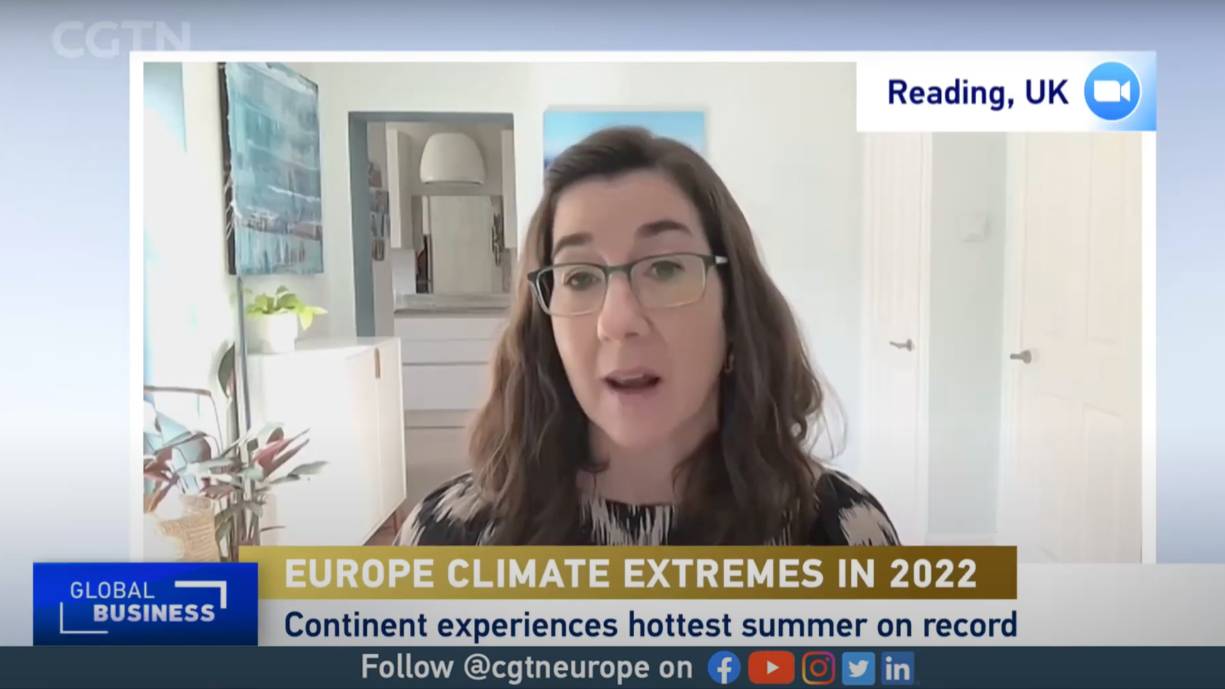04:34

The world could break a new average temperature record this year, fueled by the return of the El Nino weather phenomenon, according to EU climate scientists.
"Last year was the warmest summer on record, the second warmest year for Europe, and we were in a 'La Nina' phase," Samantha Burgess, deputy director of the EU's Copernicus Climate Change Service, told CGTN Europe.
Climate models suggest that after three years of the La Nina weather pattern in the Pacific Ocean, which tends to lower global temperatures, the world will likely experience a return to El Nino, the warmer counterpart, later in 2023 or 2024.
READ MORE
What does the IPCC's climate crisis alert mean for Europe?
Twitter drops government-funded tags on media accounts
CGTN Europe wins awards New York festival
With its arrival, winds blowing west along the equator will slow down, and warm water will be pushed east, creating hotter surface ocean temperatures.
According to Burgess, that means not only seeing record-breaking global temperatures if El Nino does come through this summer.
"The expectation is that we are likely to see more extreme events which are likely to be more intense as well," she explained.
Latest climate report
EU Copernicus scientists released a report on Thursday assessing the climate extremes the world experienced last year, its fifth-warmest year on record.
While the report covers the globe, detailing ice levels hitting a record low in the Antarctic sea and Pakistan's disastrous flooding last year, it pays particular attention to the climate crisis across the EU.
Europe, the data shows, had its hottest summer on record in 2022 and its driest year on record.

A Galician firefighter tackles flames in a forest during an outbreak of wildfires following a prolonged period of drought and unusually high temperatures in Spain's Asturias. /Vincent West/Reuters
A Galician firefighter tackles flames in a forest during an outbreak of wildfires following a prolonged period of drought and unusually high temperatures in Spain's Asturias. /Vincent West/Reuters
The Alps saw its largest loss of ice, while South Europe had the highest ever number of days with severe heat stress.
"The Mediterranean is a region that is heavily impacted by climate change and the science is very clear on that," said Copernicus's Burgess.
"The expectation is that the summers - and other seasons as well - will continue to get warmer and drier. We are already seeing heat stress in some Mediterranean countries, in Italy and Spain this year already."
She added that the region's agricultural sector was currently being particularly hard hit by two combined factors: last year's drought, which caused water stress, and then a dry autumn and winter, meaning there has not been the balance provided by rain or snow normally seen at this time of year.
Longer and more intense wildfires
The report also focuses on another climate issue which has recently hit South Europe especially hard - the growing impact of wildfires.
It showed that a number of European countries in 2022 saw the highest carbon emissions from wildfires in 15 years, while detailing the second largest burnt area from the fires in Europe's history.
"Wildfires are a big change. They are becoming more frequent and the wildfire season is becoming more intense as well," said Burgess.
She added that such extreme weather events were likely to become more prevalent over time.
'We need to adapt'
Copernicus calculates that right now the world's average global temperature is 1.2 degree Celsius higher than in pre-industrial times.
And while the agency was not yet ready to announce a definitive return to El Nino, it stressed that the phenomenon would be accompanied by a likelihood of higher temperatures.
That's combined with the fact that despite most of the world's major emitters pledging to eventually cut their net emissions to zero, global CO2 emissions last year continued to rise.
"The reality is the planet is warming and the normal that we are facing is shifting," said Burgess.
She stressed that on an individual level, humans could help combat such terrifying news by supporting organizations and political parties that were prepared to tackle the growing crisis.
"Climate change is here and this means we need to adapt," she said.
Subscribe to Storyboard: A weekly newsletter bringing you the best of CGTN every Friday
Source(s): Reuters